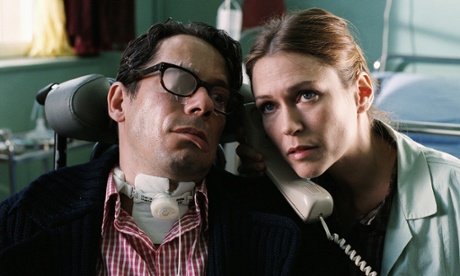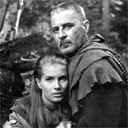There have been plenty of times when I have choked up at a sad film (Nanni Moretti's The Son's Room, "When She Loved Me" from Toy Story 2) but this is the first time I have twitched off my glasses and openly and unapologetically cried in the cinema auditorium. Having watched it for a second time, I concede this might have been triggered a little too obviously by the melancholy piano score, by the elaborate profusion of old photographs that litter the screen, showing a little boy whose vulnerability is in poignant contrast both to his worldly adulthood and to his later, catastrophic illness, and most emphatically by the unbearable spectacle of an old man in grief: Max von Sydow, playing an ancient father crying for his son.
Nothing in director Julian Schnabel's career so far has anticipated the sweetness, sadness, maturity and restraint of this lovely movie. It is a very moving and deeply satisfying version of the bestselling 1997 memoir by Jean-Dominique Bauby, the 43-year-old Parisian fashion magazine editor who, at the very height of wealth, health and success was paralysed by a stroke and suffered from "locked-in syndrome". He could hear and see perfectly, but could not move or speak. The thing he could do was blink his left eyelid and, with ferocious effort, learned to blink in a special alphabet-code and by this means "dictate" his extraordinary memoir. Bauby was submerged in a diving bell of physical immobility: that precious, fluttering eyelid was a butterfly of freedom and hope.
Armed with Ronald Harwood's robust screenplay, Schnabel has applied his visual sense to create a distinctive look and feel for his movie, part magic lantern, part hallucinatory fuzz, a watery depth from which float up memories and reveries, fantastical constructions and visions. It is only in the past and in fantasy that Bauby can escape his condition. These images drift past his field of vision, and sequences of almost narcotic melancholy or indeterminacy will suddenly snap shut as we are forced back into clinical reality. Schnabel moves with seamless assurance from Bauby's agonised, bedridden point-of-view to the third-person camera positions showing us the ruined invalid, images whose objectivity is conditioned by Bauby's fiercely unsentimental sense of self.
He is played by Mathieu Amalric: an actor with one of the most beguiling screen faces: cherubic, ironic, sensual. When a flashback shows him in his pomp, breezing into a fashion shoot, dishevelled and unshaven as only a very celebrated or handsome man can afford to be, he radiates well-being. His story is a terrible demonstration of the fragility of our bodies and our lives. Another flashback shows a "dirty weekend" he tried to have in Lourdes - the location is beyond irony - with his mistress Inès (Agathe de la Fontaine); something in the place's religiosity and piety kills their relationship. A grizzled old trinket vendor and a priest to whom Bauby is later unwillingly brought are significantly played by the same actor: Jean-Pierre Cassel.
Like an infant prince (and his condition is horribly infantilising) Bauby is surrounded by adoring women. His beautiful speech-therapist Henriette is played by Marie-Josée Croze, who has a look of Naomi Watts. Henriette is exasperated and angry with Bauby, as well as being in awe of him - and a little in love with him. Bauby's estranged partner Céline (Emmanuelle Seigner) visits him en famille and, to entertain and cheer him up, his children sing a heartrending little song about a kangaroo escaping a zoo by jumping over the wall: a song that artlessly addresses his condition. (This is another Kleenex moment.) Agonisingly, Céline is forced to stay in the room when Inès calls and wishes to talk on the speakerphone; she is forced to "translate" the intimacies Bauby can express to her only through his eyelid.
The emotional centre of the film comes in another memory: when the still-healthy Bauby comes to the apartment of his invalid father Papinou: wonderfully played by Von Sydow. Grumpily, the old man submits to the indignity of being shaved by his son; irascibly, Bauby submits to the emotional discomfiture of being told by Papinou that he is very proud of him. It is a scene whose tacit emotion uncoils in their later, fractured conversations over the telephone: Papinou is of course too frail to visit him in hospital. It is only in their enforced inarticulacy and distance that some intimacy is possible; the shattering blow of his illness has precipitated a miraculous expression of love.
Amalric is a tremendous screen actor; it may be that his forthcoming elevation to Bond villain in the new 007 film will bring him to a wider audience; I hope it does not caricature his style. This is a wonderful performance. As for Schnabel, it is an exhilarating breakthrough, and for screenwriter Ronald Harwood the movie is another triumph of responsive, creative intelligence.






